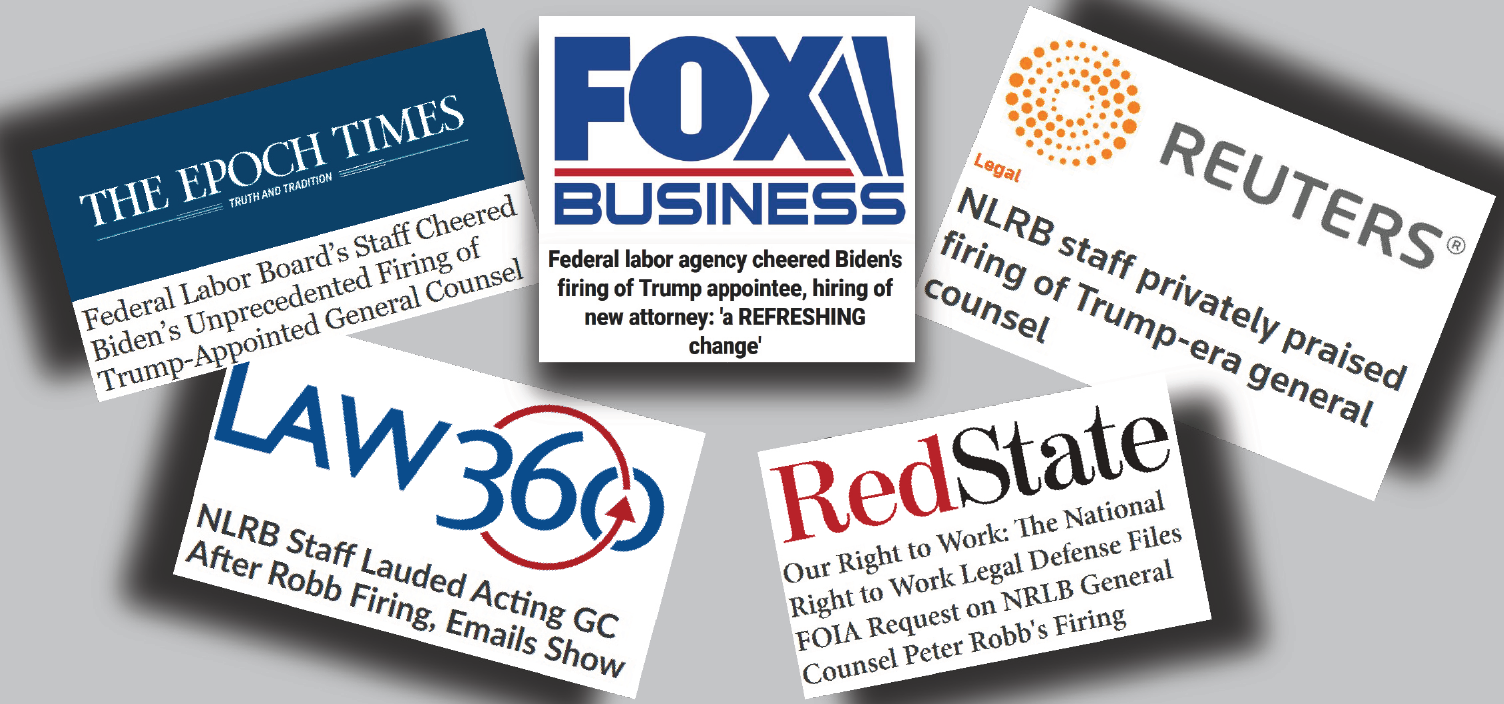Ohio Worker Defeats Unconstitutional ‘Administration Fee’ Imposed by IUOE Bosses
The following article is from the National Right to Work Legal Defense Foundation’s bi-monthly Foundation Action Newsletter, July/August 2021 edition. To view other editions of Foundation Action or to sign up for a free subscription, click here.
Union officials tried to rename forced fees outlawed by Janus Supreme Court victory
Above are just a few of the other Buckeye State public servants whom Foundation staff attorneys have aided in safeguarding their First Amendment Janus rights since that case was decided in 2018 by the Supreme Court.
CINCINNATI, OH – City of Hamilton (OH) employee Timothy Crane has successfully defended his First Amendment right to refrain from funding the International Union of Operating Engineers (IUOE) Local 20 hierarchy in his workplace.
Crane, who is not a union member, filed a lawsuit in December 2020 with free legal aid from the National Right to Work Foundation that challenged so-called “agreement administration fees” that IUOE officials forced him to pay as a condition of keeping his job. IUOE bosses have now backed down by eliminating the forced-fees scheme and have refunded to Crane all fees that they seized from him under that arrangement.
Crane’s lawsuit maintained that the “agreement administration fee” requirement violated his rights under the Foundation-argued 2018 Janus v. AFSCME Supreme Court decision. In Janus, the High Court ruled that no public worker can be coerced into paying union dues or fees as a condition of getting or keeping a job, and that union dues and fees can only be deducted from public servants’ paychecks with their affirmative and knowing consent.
The Court reasoned that, because all public sector union boss activities are directed at the government, forcing a public sector employee to pay anything to union officials counts as forced political speech and for that reason violates the First Amendment.
IUOE Officials Seized Deceptive Fee after Worker Exercised Janus Rights
“This case was about protecting my right to not pay for a political agenda that I oppose,” Crane told the Hamilton Journal-News this May. “I’m in favor of fair wages and a safe working environment. What I’m not in favor of is a union using my hard earned money to support a political party that I disagree with and that is dividing the country.”
According to Crane’s lawsuit, he sent letters to IUOE union officials in both August and September of last year attempting to exercise his First Amendment Janus right to end dues deductions from his paycheck. After sending these two letters, he discovered that instead of dues an “agreement administration fee” was being taken from his pay by municipal officials at the behest of IUOE union bosses.
His suit contended that this fee was indistinguishable from a so-called “agency fee” — a forced union payment charged to employees who refrain from formal union membership that was definitively outlawed by the Janus decision — and therefore unconstitutional despite masquerading under a different name.
Five Similar Illegal Dues Schemes Now Bucked by Buckeye State Employees
With this victory, Crane’s suit is now the fifth resolved favorably by Foundation staff attorneys for Buckeye State employees whose First Amendment Janus rights were being restricted by Ohio government union bosses.
This includes the July 2020 victory in the Allen v. AFSCME case, in which nearly 30,000 Ohio public employees were freed from an “escape period” scheme imposed by Ohio Civil Service Employees Association (OCSEA) union chiefs. That scheme limited to just a handful of days every few years the time when a public employee could exercise Janus rights.
“Once again, a Foundation-backed Ohio public employee has prevailed over a duplicitous attempt by union officials to keep worker money flowing illegally into union coffers while trampling workers’ First Amendment rights,” observed National Right to Work Foundation Vice President and Legal Director Raymond LaJeunesse. “The fact that Ohio union bosses have backed off enforcing these schemes several times now shows that they know the arrangements cannot stand up to serious legal scrutiny. With that in mind, Ohio public servants should not hesitate to reach out to the Foundation to defend their Janus rights.”
Foundation Freedom of Information Act Request Exposes NLRB Bias against Workers
The following article is from the National Right to Work Legal Defense Foundation’s bi-monthly Foundation Action Newsletter, July/August 2021 edition. To view other editions of Foundation Action or to sign up for a free subscription, click here.
Emails show NLRB insiders cheered Biden’s unprecedented attack on agency’s ‘independence’
After Foundation attorneys’ FOIA request revealed pro-Biden bias pervading the “independent” NLRB, Foundation staffers secured coverage for the findings in some of the nation’s top outlets.
WASHINGTON, DC – National Right to Work Foundation attorneys have uncovered, through a Freedom of Information Act (FOIA) request, National Labor Relations Board (NLRB) staff emails that expose the partisan response to unprecedented power grabs launched by the Biden Administration at the behest of Organized Labor.
Biden Power Grab Prompts Records Request
The FOIA request was filed to provide further details surrounding Biden’s unprecedented and legally dubious removal of Trump-appointed NLRB General Counsel Peter Robb, who had sided with Foundation-represented workers in several cases in which they sought to resist union boss coercion. The emails show widespread partisan bias throughout the agency, which is charged with neutrally enforcing federal labor law.
Under long-standing federal law, the NLRB General Counsel has unreviewable authority to prosecute unfair labor practice charges, including those brought by workers against union officials. To protect that authority from blatant political interference, Congress gave the General Counsel a four-year term. Once appointed by the president and approved by the Senate, no General Counsel in the history of the NLRB had ever been fired. That changed when, just minutes after Biden took office on January 20, 2021, his administration moved to fire Robb despite 11 months remaining on his term.
NLRB Officials Celebrated Biden Attack on Labor Board’s Top Prosecutor
Following Biden’s election with the backing of Big Labor officials who wanted to shield themselves from accountability at the NLRB, Biden was encouraged by union bosses to remove General Counsel Robb and replace him with a union partisan. Five days after the removal of Robb, Biden fully obliged, selecting career NLRB bureaucrat Peter Sung Ohr as Acting General Counsel. The FOIA-requested emails show that although some NLRB officials were surprised by Biden’s actions — with one career NLRB attorney noting the move was “not expected” — some current and former NLRB officials voiced their approval of the unprecedented actions that fly in the face of the prosecutorial independence that Congress sought to protect when the General Counsel’s office was established. Los Angeles-based NLRB Region 31 Director Mori Rubin sent an email to her colleagues reacting to the news that Alice Stock, then the number-two attorney at the agency, had been fired along with Robb. Rubin derided Stock as a “clone” of Robb. She said “there is talk that Peter Ohr may be appointed acting GC, which would be wonderful!” Respondents to the thread, whose names are redacted, proclaimed: “Go Biden!!”, “That would be terrific!” and “Hope this comes true!”
Within days Ohr rescinded almost a dozen guidance memos issued by Robb, including one ensuring workers could avoid funding union political and lobbying activities, another allowing workers to intervene in legal actions that are used to block efforts to secure decertification votes, and yet another strengthening unions’ obligations to workers subject to union boss monopoly bargaining. In all these instances Ohr took the position advocated by union officials who had backed Biden’s election campaign, and against those of Foundation-backed employees.
Ohr earned praise for his aggressive implementation of the Biden agenda. Among the emails unearthed in the FOIA request was a message to Ohr from longtime NLRB attorney Emily Hunt describing her reaction on the day of Biden’s inauguration when she learned that Robb had been removed: “I exclaimed to myself, ‘This day just keeps getting better and better!’” Hunt, whose career with the NLRB spanned over 30 years, commended Ohr for rescinding Robb’s memos.
Foundation Spreads the Word About Activism within NLRB
The NLRB emails received coverage from multiple outlets including Fox Business, The Epoch Times, and Reuters. The coverage exposed the favoritism of many inside the NLRB towards union officials despite the Board’s directive to apolitically enforce federal labor law.
“By celebrating Joe Biden’s unprecedented attack on the Board’s independence so openly, the NLRB officials in these emails make it clear that those inside their agency do not want the Board to be an independent enforcer of the law as Congress intended,” said National Right to Work Foundation Vice President Patrick Semmens. “Instead, these partisans want the Board to be an activist agency with a mission of advancing union boss power at the expense of the rights of rank-and-file workers.”
NJ, Chicago Educators Push for Supreme Court Review of Anti-Janus Schemes
The following article is from the National Right to Work Legal Defense Foundation’s bi-monthly Foundation Action Newsletter, July/August 2021 edition. To view other editions of Foundation Action or to sign up for a free subscription, click here.
Two petitions ask High Court to hear challenges to union boss-concocted ‘escape periods’
Plaintiff and Chicago Public Schools teacher Ifeoma Nkemdi called CTU union militants’ retaliation against her “a dishonor to the profession of education.” Her lawsuit seeks to force CTU bosses to respect her Janus rights.
WASHINGTON, DC – Staff attorneys from the National Right to Work Legal Defense Foundation have just submitted petitions for writ of certiorari in two class-action civil rights cases seeking to enforce workers’ First Amendment rights. In both cases, public educators are fighting union boss-created restrictions on their First Amendment right to refrain from funding unwanted union hierarchies in their workplaces.
One petition was filed for Chicago Public Schools educators Joanne Troesch and Ifeoma Nkemdi, whose lawsuit against the Chicago Teachers Union (CTU) and the Chicago Board of Education challenges an “escape period” scheme that blocks workers from exercising, outside the month of August, their right to terminate dues deductions from their paychecks.
A second petition was filed in a lawsuit brought by New Jersey teachers Susan Fischer and Jeanette Speck, who are suing the New Jersey Education Association (NJEA) union for enforcing a similar annual window that restricts employees in the exercise of their Janus rights to just 10 days annually, less than 3% of the year.
Constraints Clearly Violate Janus Mandate of Affirmative Consent to Dues
Both lawsuits argue that these union dues “escape periods” run afoul of the U.S. Supreme Court’s landmark ruling in Janus v. AFSCME, which was argued and won by Foundation staff attorneys in 2018. In Janus, the court ruled that no public worker can be forced to pay union dues or fees as a condition of keeping their job.
The Court further held that union bosses contravene the First Amendment if they seize any money from an employee’s paycheck without their affirmative consent and a knowing waiver of that employee’s First Amendment rights. Both petitions say public sector union officials’ “escape period” schemes breach this requirement.
Union Honchos Snubbed Exercise of Janus Rights, Kept Taking Money
Fischer and Speck, who both work in Ocean Township, NJ, attempted to exercise their Janus rights in July 2018, just a month after the High Court handed down the Janus decision. But Township officials told the teachers they could only stop payments and withdraw their memberships during an annual 10-day window. Unbeknownst to the teachers, union partisans in the New Jersey legislature had actually established that “escape period” by law in May 2018 in an apparent attempt to defang the pending Janus decision.
In Chicago, Troesch and Nkemdi’s complaint explains, both educators “did not know they had a constitutional right not to financially support” the union hierarchy until the fall of 2019, when they discovered their Janus rights while looking for information on how to continue working during a strike that CTU bosses ordered that October. They sent letters the same month to CTU officials to exercise their Janus right to resign union membership and cut off all dues deductions.
Both educators received no response until November of that year, when CTU officials confirmed receipt of the letters but said that they would continue to seize dues from the teachers’ paychecks “until September 1, 2020,” as per the union’s “escape period” scheme.
Teachers Urge Dissolution of ‘Escape Periods,’ Refunds for Them and Coworkers
Both lawsuits demand that union and government officials cease enforcing “escape periods,” properly apprise the educators’ coworkers of their right to end dues deductions any time, and allow any bargaining unit member to reclaim dues that have already been seized from them under such arrangements. Additionally, both cases seek to overturn state laws that codify “escape periods.”
“‘Escape periods’ like those forced on Troesch, Nkemdi, Fischer and Speck serve no purpose other than to keep shoveling into union coffers the hard-earned cash of public servants who oppose union officials’ so-called ‘representation,’ even after those employees have clearly exercised their First Amendment right to object to such payments,” commented National Right to Work Foundation Vice President and Legal Director Raymond LaJeunesse. “With opposition to these schemes growing among public employees, the Supreme Court should quickly take up this issue and clarify that Janus does not permit union bosses to profit from curtailing workers’ constitutional rights.”
Labor Board Rejects Biden Appointee’s Attempt to Scuttle Case Against Union
The following article is from the National Right to Work Legal Defense Foundation’s bi-monthly Foundation Action Newsletter, July/August 2021 edition. To view other editions of Foundation Action or to sign up for a free subscription, click here.
Texas nurse challenges concealment of secret union-employer deal which stifles decertification
With Foundation legal aid, Texas nurse Marissa Zamora shut down NLRB “Acting” General Counsel Ohr’s attempt to block her case.
WASHINGTON, DC – The National Labor Relations Board (NLRB) recently rejected a move by NLRB Acting General Counsel Peter Ohr to prematurely end Texas nurse Marissa Zamora’s case before the Board could rule. The case challenges National Nurses Organizing Committee (NNOC) union officials’ refusal to disclose a secret agreement they signed with the parent company of her hospital that limits Zamora’s ability to remove the union from her workplace.
Ohr is a career NLRB bureaucrat, who was installed as General Counsel by President Biden this January after Biden made the unprecedented move of removing Trump-appointed NLRB General Counsel Peter Robb before his Senate-confirmed four-year term expired. Ohr filed a motion in February seeking unilaterally to send Zamora’s complaint back to the NLRB’s Fort Worth regional office to be dismissed — after Zamora’s case had already been fully briefed at the full Board in Washington.
Zamora is represented for free by National Right to Work Foundation staff attorneys, who in March opposed Ohr’s attempted maneuver. Their brief argued that snuffing
the case out now would jeopardize the NLRB’s power to decide cases involving violations of federal labor law, and also contended that Ohr lacked any authority to make his motion because of Biden’s illegal ouster of Robb. In a May decision, the NLRB agreed with Zamora’s Foundation staff attorneys that the case should continue, observing that the matter “has been fully litigated, and the controversy at issue, which remains active, is ripe for Board adjudication.” The case began when Zamora demanded a copy of the secret so-called “neutrality agreement.” Such agreements are deals between union officials and employers — usually without the knowledge of employees in a workplace — that seek to assist the union in gaining monopoly bargaining powers over rank-and-file workers.
NNOC Agents Shrouded, Lied About Deal Which Stymied Info about Decertification
“The Board correctly rejected Peter Ohr’s attempt to scuttle this case so he could let union officials off scot-free despite their secret backroom deal to undermine the rights of nurses like Marissa Zamora who are subjected to unwanted union representation,” National Right to Work Foundation President Mark Mix said about the decision to let the case move forward. These controversial top-down organizing deals frequently contain provisions that require employers to silence opposition to unionization, hand over workers’ personal information for coercive “card check” drives that bypass the protections of a secret-ballot election, provide union organizers with preferential access to the workplace and even ensure employers will help stifle workers’ efforts to decertify, i.e. remove, the union.
In Zamora’s case, she began circulating fliers and other materials in June 2018 to educate her coworkers on how they could obtain a vote to decertify the union. Legal documents she filed in her case explain that union agents “repeatedly ripp[ed] down her fliers” and that hospital officials referenced a secret agreement with the union when they denied “her access to post material on protected bulletin boards, where her material would be shielded from vandalism.”
Zamora subsequently asked both NNOC and hospital officials to show her any “neutrality agreement” that might have triggered those efforts to block her and her coworkers’ rights. All her requests were denied, and NNOC even denied that such an agreement exists. This was despite statements by hospital agents to her that indicated a “neutrality agreement” was indeed in effect.
Trump-Appointed NLRB GC Robb Backed Nurse’s Case Until Unprecedented Firing
Zamora filed federal unfair labor practice charges at the NLRB, challenging NNOC bosses’ refusal to disclose the secret agreement. Then- NLRB General Counsel Robb issued a complaint supporting the claims in Zamora’s charges.
Nevertheless, a Labor Board Administrative Law Judge (ALJ) dismissed the complaint Robb issued, even revoking subpoenas that would have compelled NNOC union bosses to reveal the covert deal.
Zamora challenged the ALJ’s dismissal, filing exceptions at the full Board in Washington. Briefs she filed supporting those exceptions pointed out that, during a two-day trial, it came out that the “neutrality agreement” existed, but it was a closely guarded secret between the hospital and union officials “to be kept strictly confidential from employees and all third parties.” Robb also submitted exceptions buttressing Zamora’s exceptions.
Robb’s pro-employee decisions preceded Ohr’s controversial installation by Biden in January, and Ohr’s subsequent attempt to remand or dismiss the case, which the NLRB has now rejected.
“The Board should now promptly rule for Ms. Zamora on the merits of the case so union bosses cannot keep secret pacts with employers to the detriment of rank-and-file employees’ protected rights,” Mix said.
TX Airline Employee Urges High Court to Take Up Forced-Dues-for-Politics Challenge
The following article is from the National Right to Work Legal Defense Foundation’s bi-monthly Foundation Action Newsletter, July/August 2021 edition. To view other editions of Foundation Action or to sign up for a free subscription, click here.
IAM bosses automatically seize money for politics if workers miss tiny ‘escape window’ to opt out
IAM officials left Arthur Baisley just a small annual “escape window” to opt out of automatic dues deductions taken for union politics. Will the High Court hear his case against this scheme?
WASHINGTON, DC – Arthur Baisley, a United Airlines employee in Texas, filed a petition for writ of certiorari asking the U.S. Supreme Court to hear his case in which he is battling International Association of Machinists (IAM) union bosses. They are seizing dues for union political expenditures from him and his coworkers in violation of the First Amendment and the Railway Labor Act (RLA).
Baisley filed the cert petition this May with free legal aid from the National Right to Work Foundation. Baisley’s lawsuit challenges a union requirement that employees who choose not to join the union must opt out of funding the union’s political and ideological activities during a brief annual “escape window,” or else have money automatically seized from their paychecks for those purposes against their will.
Worker Contends Janus Standard Should Nullify ‘Opt-Out’ Language
Baisley’s attorneys argue the “opt-out” arrangement violates workers’ rights found in the RLA, and the First Amendment under the standard laid out in the landmark 2018 Supreme Court Janus v. AFSCME decision, won by Foundation staff attorneys. The RLA is a federal law that governs labor relations in the railway and airline industries.
In Janus, the High Court ruled that no public worker can be coerced into paying union dues or fees as a condition of getting or keeping a job. The Court also held that union dues or fees can only be deducted from a public employee’s paycheck with his or her affirmative consent and a knowing waiver of his or her constitutional right not to pay.
Baisley’s staff attorneys extend this logic and argue that, under Janus and other Supreme Court precedents, union bosses infringe on the First Amendment rights of private sector employees under the RLA by forcing them to pay for union boss political or ideological activities without their consent. The union boss “opt-out” scheme offends this principle by forcing workers to object to dues for politics within a small “escape window” and seizing those dues as a condition of employment if they don’t opt out.
IAM Officials’ Scheme Seizes Forced-Dues-for-Politics from Non-Members
Baisley is not a member of the IAM, but is still forced to pay some union fees despite being based in the Right to Work state of Texas. The RLA preempts state Right to Work protections which make union membership and all union financial support strictly voluntary. However, under long-standing law established in Foundation-supported cases, even without Right to Work protections non-members cannot, as a condition of keeping their jobs, be required to pay fees for anything beyond the union’s expenses directly related to bargaining.
Baisley’s petition details the convoluted union boss-created process that workers must navigate just to prevent money from being taken from their paychecks in violation of their First Amendment rights. In Baisley’s situation, even though he sent a letter to IAM agents in November 2018 objecting to funding all union political activities, union officials only accepted his objection for 2019, and told Baisley he had to renew his objection the next year or else be charged full union dues.
IAM Union Officials Contravened Both Janus and Long-Standing Federal Law
In addition to running afoul of the Janus First Amendment standard, Foundation staff attorneys also assert that the complicated “opt-out” scheme contravenes the RLA, which protects the right of employees under its jurisdiction to “join, organize, or assist in organizing” a union of their choice, as well as the right to abstain from all union activities.
“The sordid goal of these kinds of union ‘opt-out’ requirements is clear: trap unsuspecting workers into subsidizing union bosses’ radical political agenda without their consent and in violation of their rights,” said National Right to Work Foundation Vice President Patrick Semmens. “The Supreme Court ruled in the Foundation-won Janus case that union officials must first seek the affirmative approval of public sector workers before charging them for union politics, and this case simply seeks to ensure that Mr. Baisley and all employees subject to the RLA enjoy those same basic protections.”
Teamsters Union Charged with Illegally Threatening UPS Worker: ‘Join Union or Be Fired’
The following article is from the National Right to Work Legal Defense Foundation’s bi-monthly Foundation Action Newsletter, May/June 2021 edition. To view other editions of Foundation Action or to sign up for a free subscription, click here.
Teamsters official falsely claimed worker could be fired if he did not join and pay full dues
UPS worker Kamil Fraczek refused to kowtow to Teamsters officials’ threats in his workplace when they untruthfully told him that he had to formally join the union and pay dues just to keep working.
QUEENS, NY – With free legal aid from the National Right to Work Legal Defense Foundation, New York City UPS warehouse worker Kamil Fraczek has filed a National Labor Relations Board (NLRB) charge against Teamsters Local 804. The charge came after a Teamsters union official made repeated threats to his job and lied about his legal rights.
Union Official Refused to Respect Worker’s Rights under Beck Decision
When Fraczek began working at the warehouse full-time, a Teamsters representative tried to mislead him by telling Fraczek he must become a union member and sign documents authorizing dues deductions from his paycheck. Fraczek specifically asked about other options, but the union representative told him that if he did not sign the forms, Teamsters officials would ask UPS to fire him.
Because New York is a forced-unionism state that doesn’t protect workers with a Right to Work law, Fraczek can be required to pay some union fees as a condition of his job.
However, under long-standing federal law, workers cannot be required to become formal union members nor can they be required to pay full union dues even in non- Right to Work states. Under the Supreme Court’s 1988 CWA v. Beck decision, won by National Right to Work Legal Defense Foundation attorneys, no private sector worker can be compelled to financially support union activities unrelated to bargaining.
Union Misinformation Continues Even after Employee Demanded Rights
Expenses which can’t be charged to non-members under Beck include political expenditures and members-only activities.
Knowing his actual rights, Fraczek returned to the Teamsters official asking to be recognized as a non-member and Beck objector. He provided a letter to the representative stating his intention to pay only reduced fees and declining union membership.
As the unfair labor practice charge states, instead of accepting Fraczek’s request, the Teamsters official doubled down on his prior illegal threats. He demanded that Fraczek pay full dues and sign membership documents or face termination.
“Local 804’s agent has repeatedly tried to mislead Mr. Fraczek about his rights and has invoked the Union’s power to get him fired, all in an effort to coerce Mr. Fraczek into signing the membership and dues deduction authorization form . . .”
– Fraczek’s NLRB Charge
The official falsely claimed that only supervisors can opt out of the union, and that the federal laws protecting workers from funding union political activities only apply in Right to Work states, not in forced-unionism states like New York.
In response, Fraczek’s Foundation staff attorneys filed an NLRB charge asserting his right to pay reduced fees under Beck and not to join the union.
Teamsters Union Hit with Federal Charges for Illegal- Dues Demands
According to the charge, “Local 804’s agent has repeatedly tried to mislead Mr. Fraczek about his rights and has invoked the Union’s power to get him fired, all in an effort to coerce Mr. Fraczek into signing the membership and dues deduction authorization form…”
“Union officials are perfectly willing to tell outright lies to independent-minded workers who object to union membership,” said National Right to Work Foundation President Mark Mix. “Union bosses blatantly ignore the law just to protect their forced-dues revenue stream, and it is workers like Mr. Fraczek who pay the price.”
NLRB Blocks Attempt to Oust Union, Despite Unanimous Call for Union’s Removal
The following article is from the National Right to Work Legal Defense Foundation’s bi-monthly Foundation Action Newsletter, May/June 2021 edition. To view other editions of Foundation Action or to sign up for a free subscription, click here.
Every employee signed a petition for vote to remove Carpenters Union from their workplace
Foundation staff attorneys are defending Neises Concrete Construction Corp. workers’ unanimous call to free themselves from the coercive reign of IKORCC union bosses.
CROWN POINT, IN – Mike Halkias and his coworkers at Neises Construction Corp. in Crown Point, Indiana, are subject to monopoly “representation” by officials of the Indiana/Kentucky/Ohio Regional Council of Carpenters (IKORCC) union.
Every bargaining unit member exercised the right under Indiana’s Right to Work Law to decline formal union membership and to refuse to pay any union dues or fees, but union officials still have the authority under federal law to “negotiate” with Neises for the employees despite their objections to that representation.
NLRB Officials Snub Workers’ Unanimous Petition, Demand Union Bargaining
With free legal aid from the National Right to Work Legal Defense Foundation, Halkias submitted a decertification petition to Region 13 of the National Labor Relations Board (NLRB), signed by every member of his unit, to remove IKORCC union officials from their workplace.
Despite unanimous agreement by the unit’s workers to hold a vote to oust IKORCC bosses, NLRB Region 13 officials rejected the decertification petition. The Regional Director is demanding that the Indiana employer bargain with IKORCC, even though none of its employees want the union to “represent” them.
Union Bosses Won’t Give Up Monopoly Bargaining Power over Non-members
So far union officials have stymied the vote through “blocking charges,” unfair labor practice charges filed by union lawyers that, before they are resolved, prevent a vote from taking place. Union officials claim the vote cannot proceed until the company negotiates “in good faith” with the union.
That demand comes even though federal law makes it illegal for an employer to engage in bargaining with a union that it knows lacks the support of at least a bare majority of workers. The NLRB regional official’s order dismissing the employees’ petition did not even acknowledge that every employee in Mr. Halkias’ bargaining unit has shown a desire to be independent from the union by resigning union membership and asking for a decertification vote.
Foundation Attorneys Bring Fight to National Board
The Foundation staff attorneys who represent Halkias have appealed to the NLRB in Washington to overturn the rejection of the decertification petition and to allow the workers to vote so they can be rid of the union whose so-called “representation” they all oppose. “It is outrageous that in a workplace where every single worker wants nothing to do with a union, federal law still forces workers to accept the so-called ‘representation’ of union bosses,” said National Right to Work Foundation Vice President Patrick Semmens.
“The fact that this appeal is even necessary demonstrates how rigged federal law is against independent-minded workers who seek to exercise their right not to associate with a union.”
“This case is a reminder that, even in Right to Work states that protect workers from being forced to fund a union they don’t support, federal law still forces workers under union monopoly control even when those employees oppose the union and believe they would be better off without it.”
TX Airline Employee Urges High Court to Take Up Forced-Dues-for-Politics Challenge
The following article is from the National Right to Work Legal Defense Foundation’s bi-monthly Foundation Action Newsletter, July/August 2021 edition. To view other editions of Foundation Action or to sign up for a free subscription, click here.
IAM bosses automatically seize money for politics if workers miss tiny ‘escape window’ to opt out
IAM officials left Arthur Baisley just a small annual “escape window” to opt out of automatic dues deductions taken for union politics.
WASHINGTON, DC – Arthur Baisley, a United Airlines employee in Texas, filed a petition for writ of certiorari asking the U.S. Supreme Court to hear his case in which he is battling International Association of Machinists (IAM) union bosses. They are seizing dues for union political expenditures from him and his coworkers in violation of the First Amendment and the Railway Labor Act (RLA).
Baisley filed the cert petition this May with free legal aid from the National Right to Work Foundation. Baisley’s lawsuit challenges a union requirement that employees who choose not to join the union must opt out of funding the union’s political and ideological activities during a brief annual “escape window,” or else have money automatically seized from their paychecks for those purposes against their will.
Worker Contends Janus Standard Should Nullify ‘Opt-Out’ Language
Baisley’s attorneys argue the “opt-out” arrangement violates workers’ rights found in the RLA, and the First Amendment under the standard laid out in the landmark 2018 Supreme Court Janus v. AFSCME decision, won by Foundation staff attorneys. The RLA is a federal law that governs labor relations in the railway and airline industries.
In Janus, the High Court ruled that no public worker can be coerced into paying union dues or fees as a condition of getting or keeping a job. The Court also held that union dues or fees can only be deducted from a public employee’s paycheck with his or her affirmative consent and a knowing waiver of his or her constitutional right not to pay.
Baisley’s staff attorneys extend this logic and argue that, under Janus and other Supreme Court precedents, union bosses infringe on the First Amendment rights of private sector employees under the RLA by forcing them to pay for union boss political or ideological activities without their consent. The union boss “opt-out” scheme offends this principle by forcing workers to object to dues for politics within a small “escape window” and seizing those dues as a condition of employment if they don’t opt out.
IAM Officials’ Scheme Seizes Forced-Dues-for-Politics from Non-Members
Baisley is not a member of the IAM, but is still forced to pay some union fees despite being based in the Right to Work state of Texas. The RLA preempts state Right to Work protections which make union membership and all union financial support strictly voluntary. However, under long-standing law established in Foundation-supported cases, even without Right to Work protections nonmembers cannot, as a condition of keeping their jobs, be required to pay fees for anything beyond the union’s expenses directly related to bargaining.
Baisley’s petition details the convoluted union boss-created process that workers must navigate just to prevent money from being taken from their paychecks in violation of their First Amendment rights. In Baisley’s situation, even though he sent a letter to IAM agents in November 2018 objecting to funding all union political activities, union officials only accepted his objection for 2019, and told Baisley he had to renew his objection the next year or else be charged full union dues.
IAM Union Officials Contravened Both Janus and Long-Standing Federal Law
In addition to running afoul of the Janus First Amendment standard, Foundation staff attorneys also assert that the complicated “opt-out” scheme contravenes the RLA, which protects the right of employees under its jurisdiction to “join, organize, or assist in organizing” a union of their choice, as well as the right to abstain from all union activities.
“The sordid goal of these kinds of union ‘opt-out’ requirements is clear: trap unsuspecting workers into subsidizing union bosses’ radical political agenda without their consent and in violation of their rights,” said National Right to Work Foundation Vice President Patrick Semmens. “The Supreme Court ruled in the Foundation-won Janus case that union officials must first seek the affirmative approval of public sector workers before charging them for union politics, and this case simply seeks to ensure that Mr. Baisley and all employees subject to the RLA enjoy those same basic protections.”
Multiple Units Oust Teamsters Bosses Thanks to Foundation-Backed NLRB Rule
The following article is from the National Right to Work Legal Defense Foundation’s bi-monthly Foundation Action Newsletter, May/June 2021 edition. To view other editions of Foundation Action or to sign up for a free subscription, click here.
Unpopular Teamsters officials voted out of California, New Jersey workplaces
Reforms urged by Foundation staff attorneys eased Miguel Valle and his coworkers’ near-unanimous effort to vote out unpopular Teamsters officials, who tried to use “blocking charges,” ultimately to no avail.
WASHINGTON, DC – Workers in California and New Jersey who were previously subject to Teamsters bosses’ monopoly bargaining authority have freed themselves from unwanted union control.
The workers received free legal aid from Foundation staff attorneys, and benefited from rule changes at the National Labor Relations Board (NLRB) in Washington pushed for by the Foundation.
In California, Eliseo Haro, an employee at Los Angeles-based KWK Trucking, Inc., submitted a decertification petition with the NLRB because he and his coworkers were being ignored by Teamsters bosses. As Haro puts it, “The union never came in to talk to us, or negotiate a contract, or represent us. They disappeared.”
Haro’s petition was signed by nearly 80 percent of the workers in the 119-employee bargaining unit and called for an NLRB-supervised decertification election, in which KWK employees could vote out the unpopular union officials.
Rather than face an overwhelming defeat in the decertification election, Teamsters bosses chose to walk away. The union disclaimed interest in the unit, and NLRB Region 21 revoked Local 986’s certification as the workers’ monopoly bargaining agent.
New Jersey Decertification Effort Succeeds Despite Union Stall Tactics
In Cinnaminson, New Jersey, Teamsters officials did not immediately leave when a decertification petition was filed by Miguel Valle and his coworkers at a branch of XPO Logistics. Instead, Teamsters lawyers used nearly two months of unnecessary court proceedings to delay the election.
They demanded the vote be held in person at the Teamsters union hall. Foundation attorneys argued that the union lawyers’ requests were merely an effort to delay the vote. Ultimately, as expected, the NLRB’s Regional Director ruled that the election would be conducted by mail.
When Valle and his coworkers finally had their election, they voted 16-2 to remove Teamsters bosses from their workplace.
Foundation-Backed Rule Changes Reduce Needless Election Delays
For workers, just getting a decertification election is often difficult. In some cases, union bosses have created multi-year delays to stymie decertification efforts, trapping workers under union monopoly “representation” and often forced-dues payments they oppose, while they wait for a vote.
Union officials frequently attempt to delay or block decertification votes by filing “blocking charges,” unfair labor practice charges that can be used to hold up an election, even when they have nothing to do with the employees’ dissatisfaction with the union.
Union officials’ ability to use this tactic to block or delay votes has been limited by recent NLRB rulemaking, finalized in 2020. Under the NLRB’s new policy, which draws on comments filed by the National Right to Work Foundation, union charges cannot indefinitely stall employee votes, and in most instances votes occur without delay.
Additionally, as the Foundation advocated in its comments, instead of ballots being impounded for months or even years while “blocking charges” are resolved, the NLRB modified its original proposed rule so that in most cases ballots are tallied and the results are announced after employees vote.
“Union bosses can stick around for years, even when they face overwhelming opposition from rank-and-file workers, because of the legal barriers that protect union officials from decertification votes,” said National Right to Work Foundation Vice President and Legal Director Raymond LaJeunesse.
“Thanks to Foundation-backed reforms to the NLRB’s ‘blocking charge’ policy, union officials’ ability to trap workers in union ranks through legal trickery despite overwhelming opposition has been significantly curtailed.”
WV, TX Employees Defend Rights as Biden NLRB Appointee Attempts to Block Cases
The following article is from the National Right to Work Legal Defense Foundation’s bi-monthly Foundation Action Newsletter, May/June 2021 edition. To view other editions or to sign up for a free subscription, click here.
‘Acting’ GC tries to stop prosecution of union bosses for illegal dues, secret-organizing deal
Marissa Zamora is challenging the authority of NLRB “Acting” General Counsel Peter Ohr, who was installed by Pres. Biden in an unprecedented power grab and began attacking the rights of workers opposed to associating with union officials.
WASHINGTON, DC – President Biden’s unprecedented removal of National Labor Relations Board (NLRB) General Counsel Peter Robb, and subsequent installation of forced-unionism zealot Peter S. Ohr as Robb’s “Acting” replacement, quickly threatened workers’ individual rights. It also threatened the independence of the Board itself, including in multiple ongoing cases brought with National Right to Work Foundation legal aid.
In two cases brought by Foundation staff attorneys that are already before the NLRB, Ohr is attempting to stop the Board from ruling against union officials. One is a case for Texas-based nurse Marissa Zamora, which challenges union officials’ ability to hide secret “neutrality agreements” that limit workers’ rights. The other, brought for West Virginia Kroger employee Shelby Krocker, seeks to prosecute union officials for coercing workers into signing dues checkoff authorizations that are supposed to be voluntary.
Former NLRB General Counsel Peter Robb, who supported the workers in both of these cases, was removed by President Biden just minutes after his inauguration, despite the fact that Robb still had nearly 11 months remaining in his Senate-confirmed four-year term.
This unprecedented and possibly illegal maneuver flies in the face of the law creating the NLRB, which envisioned an independent General Counsel. Since the office of NLRB General Counsel was established in 1947, no sitting General Counsel of the NLRB has ever been fired by a president before the end of their term, even when the White House changed hands.
Zamora’s case progressed to the full NLRB in Washington, D.C., after an NLRB Administrative Law Judge (ALJ) dismissed a complaint that former NLRB General Counsel Peter Robb had issued, prosecuting the National Nurses Organizing Committee (NNOC) for refusing to disclose to represented employees its secret “neutrality agreement.”
TX Nurse Fights Biden Appointee Move to Shield Union’s Secret Deal
Though Zamora’s Foundation-provided attorneys and Robb had both filed exceptions urging the full Board to reverse the ALJ’s decision, NLRB Acting General Counsel Peter Ohr filed a motion on February 23, 2021, seeking unilaterally to send the complaint back to the NLRB Fort Worth regional office to be dismissed.
So-called “neutrality agreements” are organizing deals struck between union officials and employers, usually without the knowledge of employees in a workplace. They frequently contain provisions that require employers to silence opposition to unionization. In Zamora’s situation, the neutrality agreement was used to limit her ability to inform her coworkers about their right to vote out the union.
Zamora’s opposition brief challenges Ohr’s attempt to kill the case. It argues that the case is already before the full Board, and she “is a full party with a right to have her pending exceptions decided by the Board.” It notes that letting Ohr shut her out at this stage would “infringe on the Board’s exclusive power to adjudicate violations of” federal labor law.
Further, the brief contends that because of Robb’s unlawful removal, Ohr lacks the legal authority to even ask the NLRB to end the case. Allowing “the President to fire the General Counsel at will would do irreparable damage to the NLRB’s function as an independent agency,” the brief says.
In Krocker’s case, NLRB Region 6 in Pittsburgh initially dismissed Krocker’s charge challenging United Food and Commercial Workers Union (UFCW) checkoff cards which falsely stated that they “MUST BE SIGNED.”
West Virginia Kroger Employee Stands Up to Union-Allied Ohr
Foundation attorneys successfully appealed this dismissal to General Counsel Peter Robb, who sustained the charge and ordered NLRB Region 6 to issue a complaint prosecuting UFCW Local 400 for the violation.
In fact, Robb ordered Region 6 to issue the complaint on several additional grounds, including maintenance of a checkoff that prohibited employees from ending dues deductions after the expiration of a contract.
After an ALJ declined to rule that UFCW Local 400 officials violated the law with their “MUST BE SIGNED” demands and other unlawful provisions, Krocker’s Foundation staff attorneys and General Counsel Robb both appealed the case to the NLRB. Their appeals have been fully briefed before the Board since September.
After Ohr’s appointment, Region 6 entered into an inadequate informal settlement over Krocker’s objection and filed a motion to send the case back to Region 6.
Biden Appointee Shielding Union Boss Privileges
Krocker’s opposition to that motion argues, as does Zamora’s, that her case is already pending before the full NLRB and that Ohr lacks the authority to divert it away from the Board’s judgment.
“‘Acting’ NLRB General Counsel Peter Ohr’s unabated attacks on Foundation cases seeking to defend workers’ individual rights clearly show how imminent a threat our cases are to union bosses’ coercive and greedy behavior,” commented National Right to Work Foundation Vice President Patrick Semmens. “Ohr demonstrates repeatedly that he has no problem with turning the NLRB into the Biden Administration’s tool for stifling the rights of independent-minded workers who dare to stand up to Biden’s union boss allies.”















